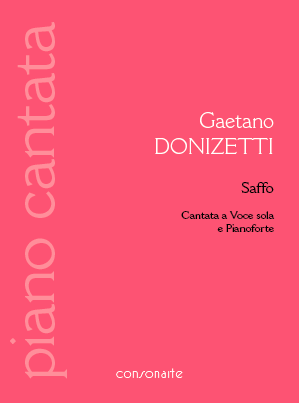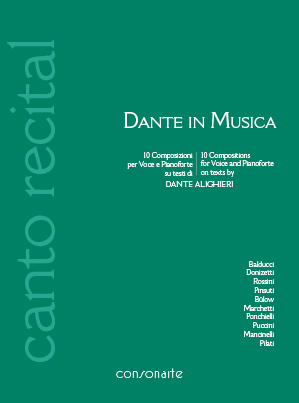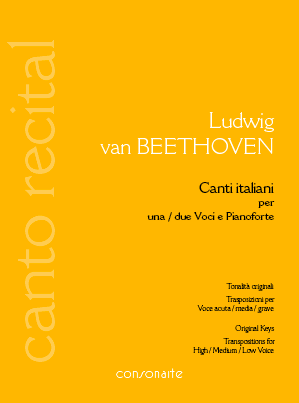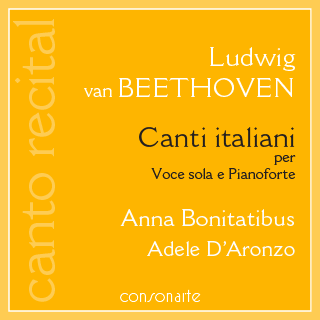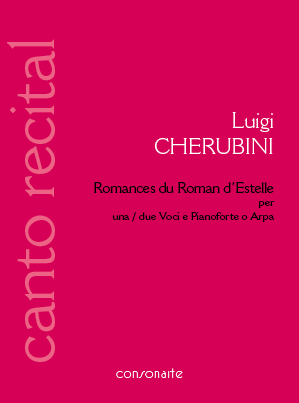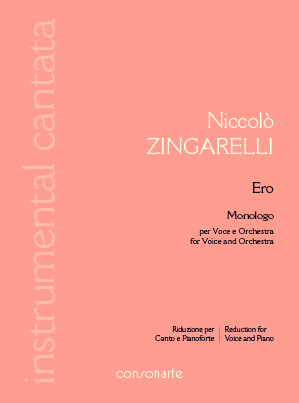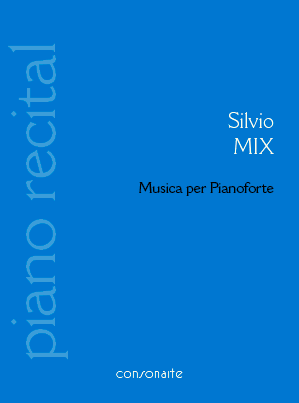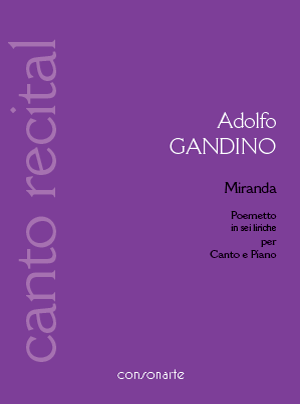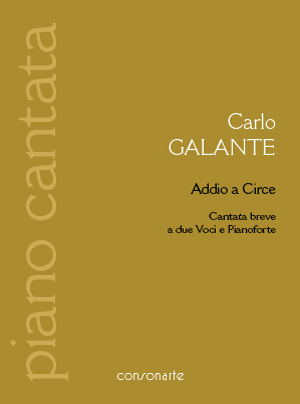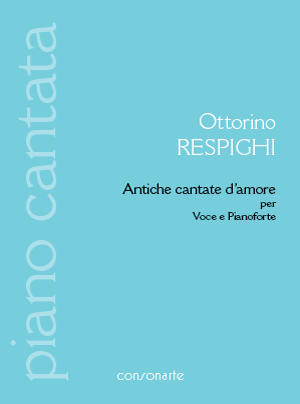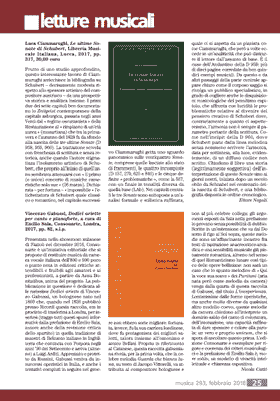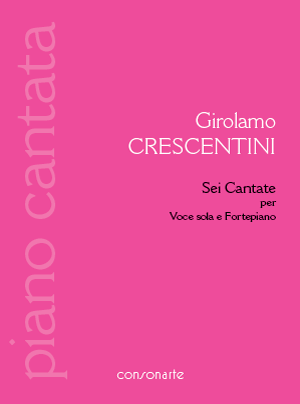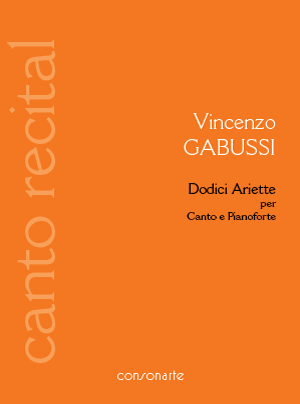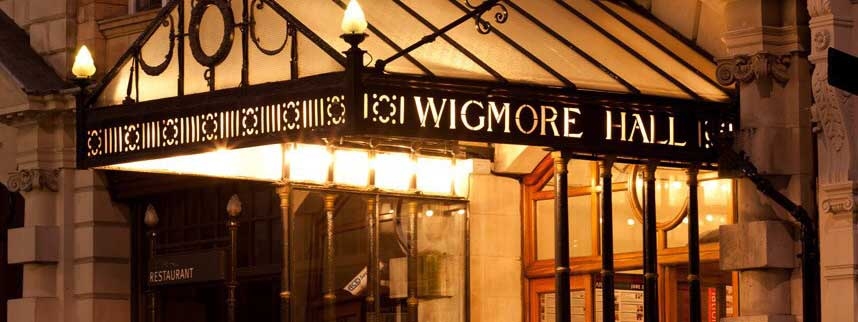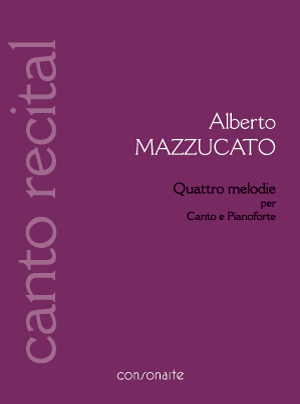News
Consonarte: Lirica in London!
23 Aug 2023

We are glad to announce the showcase promoted by the publishing house Consonarte – Vox in Musica that will take place on 23 November 2023 in London. This showcase aims to broaden the knowledge and dissemination of a precious vocal and instrumental repertoire. On this occasion, the founder and director of Consonarte publications, Anna Bonitatibus, gathers around her a mixture of more established artists and newer artists of promise from the English scene, recreating an artistic partnership in the sign of continuity. Professor Roger Parker and Head of Scores at the Presto Music shop, Ellena Taylor, will speak on vital topics relating to the industry.
SAFFO by Gaetano Donizetti — now available!
28 jun 2023
The first edition, in modern times, of “Saffo, Cantata a Voce sola e Pianoforte” by Gaetano Donizetti is now available! The volume includes a preface with new historical information related to the composition, by Anna Bonitatibus, and the critical revision of the Cantata edited by Alessandro Monga and Anna Bonitatibus.
Dante in Musica — now available!
4 nov 2022
Now available the collection “Dante in Musica” inaugurates a new series of Consonarte Editions dedicated to great Poets. This Edition includes 10 original Compositions for Voice and Pianoforte (male and female voices / low and high voices) conceived on Dante Alighieri poetic texts, by – in chronological order – Balducci, Donizetti, Rossini, Pinsuti, Bülow, Marchetti, Ponchielli, Puccini, Mancinelli, Pilati.
Antonio Caldara SEMIRAMIDE IN ASCALONA
19.02.2022
We are glad to announce that Consonarte Edition of Antonio Caldara SEMIRAMIDE IN ASCALONA “Introduzione” and Aria “Povera navicella”, will be performed today, at the 44. Händel Festspiele in Karlsruhe, for the Gala “Prime Donne” interpreted by Anna Bonitatibus and Badische Staatkapelle, conducted by Attilio Cremonesi.
To learn more regarding our Rental material: Visit our rental page
Ludwig van Beethoven – Canti italiani, now available!
2 aug 2021
The project dedicated to Canti italiani by Ludwig van Beethoven continues with the publication of Compositions for one / two Voices and Pianoforte on Italian poetic texts by the Maestro from Bonn.
New Edition: Preface by Anna Bonitatibus and Critical Revision by Alessandro Monga.
“I Canti italiani di L. van Beethoven” Recensione dell'Album digitale di Luisa Antoni
13.07.2021
Malgrado l’onnipresenza e la sovraesposizione delle creature dell’industria musicale che oscurano tutto il resto, spesso noi ‘del mestiere’ per passaparola o per pura fortuna ci imbattiamo delle perle nascoste ai più. Una di queste perle è l’album di Canti Italiani di Ludwig van Beethoven, pubblicato a marzo 2021 dalla casa editrice Consonarte.
Ludwig van Beethoven – Canti italiani: Release Date!
22 feb 2021
We are pleased to announce the release - on 12 March 2021 - of the recording "Canti italiani", a Consonarte production, and with a new interpretation by Anna Bonitatibus, Mezzosoprano & Adele D'Aronzo, Pianoforte.
All the insights, including track previews, are available in the section dedicated to Productions.
Luigi Cherubini – Romances du Roman d'Estelle, now available!
18 dec 2020
The first Volume of the publishing project on Luigi Cherubini's Musica vocale da camera, Romances du Roman d'Estelle, is now available in the Critical Edition by Elisabetta Pasquini.
Ludwig van Beethoven’s 250th birthday
16 Dec 2020
To celebrate Ludwig van Beethoven’s 250th birthday, we are pleased to announce the recording of “Italian songs”, a production by Consonarte and with the new interpretation of Anna Bonitatibus & Adele D'Aronzo. Soon...
Niccolò Zingarelli “Ero — Monologo per Voce e Orchestra / Vocal Score” Available
22 jul 2020
The first Edition of Ero — Monologo per Voce e Orchestra by Niccolò Zingarelli, is now available as a reduction for Voice and Piano. Critical Edition by Roger Parker.
Welcome to Antonio Rostagno!
May 2020
We are glad to announce a new collaboration with Antonio Rostagno, Professor of Musicology at La Sapienza University, Rome.
Silvio Mix “Musica per Pianoforte” Available
02 apr 2019
The first Edition of Musica per pianoforte by Silvio Mix is available and makes its debut at Musikmesse – Frankfurt Music Trade Fair 2019!
Adolfo Gandino “Miranda” Available
07 feb 2019
Today we are happy to announce the availability of our latest publication: Miranda Poemetto in sei Liriche per Canto e Piano by Adolfo Gandino.
Carlo Galante “Addio a Circe” Available
07 dec 2018
Today we are happy to announce the availability of our latest publication: Addio a Circe Cantata breve a due Voci e Pianoforte by Carlo Galante.
Bollettino di Studi belliniani – IV, 2018
Musiche vocali da camera: addenda e corrigenda
Carlida Steffan
«Guarda che bianca luna»: Vincenzo contra Vincenzo
[…] Ora sappiamo che Bellini non è l’autore di questa «romanza», scritta invece da Vincenzo Gabussi, come ha rivelato la recente edizione moderna della raccolta di dodici ariette del compositore bolognese, curata da Emilio Sala.* Essa fa parte di una silloge pubblicata da Ricordi, a Milano, nel 1826, e di cui oggi conosciamo solo tre esemplari, conservati rispettivamente al Conservatorio «G. Verdi» di Milano, alla Biblioteca nazionale marciana di Venezia e alla Bibliothèque musicale de la Ville de Genève.
* VINCENZO GABUSSI, Dodici ariette per Canto e Pianoforte, a cura di Emilio Sala, Londra, Consonarte, 2017, p.VI: «Ma per quanto riguarda le interferenze tra Gabussi e Bellini non se ne può non citare una di tipo “in-volontario”, di cui si è subito accorta Anna Bonitatibus (la madrina di questa benemerita collana [Vox in musica]). Una delle Dodici Ariette di Gabussi (la n. 7, sul famoso testo “Guarda che bianca luna”) è identica a quella – sulle stesse parole – di Bellini».
Ottorino Respighi "Antiche cantate d’amore" Now Available
24 sep 2018
Today we are happy to announce the availability of our latest publication: Antiche cantate d’amore per Voce e Pianoforte by Ottorino Respighi.
Enjoy!
MUSICA Febbraio 2018
feb 2018
Grateful to Musica - Rivista di cultura musicale e discografica for their precious — and our 1st — review dedicated to Consonarte's Editions!
Vincenzo Gabussi: Ventiquattro Ariette, revision by Emilio Sala Università degli Studi di Milano.
Presentata nello showroom milanese di Fazioli nel dicembre 2016, Consonarte e` un’iniziativa editoriale che si propone di restituire musica da camera vocale italiana dell’800 e 900 poco o punto nota in edizioni critiche attendibili e fruibili agli amatori e ai professionisti, a partire da Anna Bonitatibus, anima del progetto. La pubblicazione in questione e` dedicata alle rarissime Dodici ariette di Vincenzo Gabussi, un bolognese nato nel 1800 che, quando nel 1826 pubblico`
L’ Ape Musicale
21 Aprile 2018
Non sfigura fra cotanto senno l'oscuro Gabussi con La luna e La protesta d'amore, né il non più frequentato Perucchini, altro testimone di una diffusa civiltà del canto, della poesia intonata nei salotti. Più ancora di Se i sospiri degli amanti, nell'intensità di scrittura del bergamasco colpisce l'intonazione accorata di Odi d'un uom che muore, il medesimo testo noto per un'elegia di Donizetti ma soprattutto per una struggente dedica di Rossini alla seconda moglie (l'Elvira originale vi è, infatti, convertita in Olimpia), tutta giocata su altro, soffuso e minimalista, registro espressivo.
Da: “Palpiti in salotto” di Roberta Pedrotti • Bologna, concerto Bonitatibus, 17/04/2018
FROM THE WEB/SOCIAL NETWORK Wigmore Hall
25 jan 2018
The turning point for me was the Mercadante cantata, which I did not know. Great job Farnocchia and Scalera, for the mutual communication. We should hear more Mercadante, shouldn’t we?
Best moment of the night was Boni and Farnocchia’s duet in Donizetti’s Il giuramento – their voices work so well together. You could tell they’ve sung together a lot, too, but their tones are wonderfully suited to each other.
High point was Boni’s rendition of Malibran’s Nel cor più non mi sento, which, for those who don’t know, is an excuse for the singer to show off their versatility, as each return of the main tune is done in a different style, from contained pathos to operetta silliness, through trills and octave jumps.
The night ended on an ensemble high with a really well balanced I gondolieri, where we got to hear some of Rossini’s strengths
Girolamo Crescentini "Sei Cantate" Now Available
28 feb 2018
Oggi, compleanno della "Primadonna assoluta" Isabella #Colbran, siamo felici di annunciare la pubblicazione dell'Edizione delle "Sei Cantate per voce sola e Fortepiano" di Girolamo #Crescentini, insegnante e tutore della Colbran!
Enjoy!
“GUARDA CHE BIANCA LUNA”: GABUSSI & BELLINI, OMONIMIA?
25 Ott 2017
Consonarte pubblica per la prima volta, in tempi moderni, le Dodici Ariette di Vincenzo GABUSSI. Il volume, a cura del Prof. Emilio Sala, contiene la famosa Arietta “Guarda che bianca luna” sino ad ora attribuita erroneamente a Vincenzo BELLINI.
“GUARDA CHE BIANCA LUNA”: GABUSSI & BELLINI, HOMONIMY?
25 Oct 2017
Consonarte publishes for the first time, in the modern day, Vincenzo GABUSSI's Dodici Ariette in a revision by Prof. Emilio Sala. The volume contains the famous Arietta ‘Guarda che bianca luna’ attributed, erroneously, to Vincenzo BELLINI.
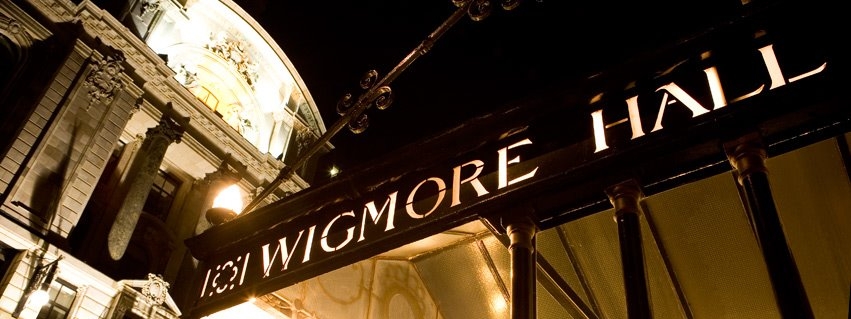
Lirica italiana at Wigmore Hall
First evening 25 January 2018
The prestigious Recital hall in London just announced the two special events organized with Anna Bonitatibus
& Consonarte - Vox in Musica.
Read more and reserve your seat for a unique experience.
Lirica italiana at Wigmore Hall
Second evening 27 January 2018
The prestigious Recital hall in London just announced the two special events organized with Anna Bonitatibus
& Consonarte - Vox in Musica.
Read more and reserve your seat for a unique experience.
Vincenzo Gabussi's "Dodici Ariette" Now Available
10 Jul 2017
Un primo piano tutto per lui: Vincenzo Gabussi Dodici Ariette per Canto e Pianoforte — per tutte le voci!
Centre stage only for him: Vincenzo Gabussi Dodici Ariette for Voice and Pianoforte — for all voices!
Retail Accounts Now Available
1 Mar 2017
Once your Retail account has been approved, while logged into your Retailer Account, each item will display automatically with prices exclusive to Retailers, furthermore, each item will display discounted quantity pricing where applicable.
Consult Retail Account page for further details.

Consonarte ospite a Radio3 Suite, il 6 Gennaio, ore 22.15.
Nel corso del programma verranno trasmessi alcuni brani eseguiti durante l'evento di presentazione del progetto editoriale – e relativi al I Catalogo – tenutosi lo scorso 21 Dicembre 2016, presso lo showroom Fazioli, a Milano; interverrà Anna Bonitatibus.
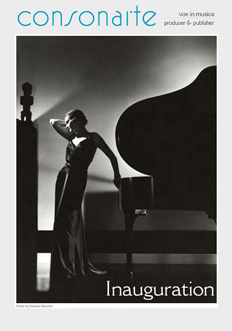
No. 1
Inauguration of Consonarte
– Vox in Musica
Wednesday 21 December 2016, at Fazioli’s Showroom.
With the extraordinary participation of:
Anna Bonitatibus, Leonardo Cortellazzi, Serena Farnocchia, Vivica Genaux,
Akiko Kozato
&
Adele D’Aronzo,
Paolo Raffo, Vincenzo Scalera.
Alberto Mazzucato's "Quattro melodie" at the printers
19 Oct 2016
Elisabetta Pasquini + Consonarte
11 Oct 2016
We are glad to announce the participation of the musicologist Elisabetta Pasquini in our publishing project and she will edit the volume Virginia, Cantata for Soprano and Pianoforte by Saverio Mercadante.
Siamo lieti di annunciare la partecipazione al nostro progetto editoriale della musicologa Elisabetta Pasquini che curerà l’edizione della Cantata Virginia per Soprano e Pianoforte, di Saverio Mercadante.
Anna Bonitatibus in regal form as Queen Semiramide at Wigmore Hall
08/ott/2016
Rating: ★★★★
By Travis Mason for bachtrack, 08 October 2016
Italian mezzo-soprano Anna Bonitatibus is well known as an operatic singer, including a variety of trouser roles, being very much the go-to Cherubino for any star-studded Marriage of Figaro, a part she has made her own. She brought her sense of operatic drama to this Wigmore Hall recital of a programme with which she is touring Europe, namely works inspired by Assyrian Queen Semiramide, who lived and ruled in the 9th century BC. Semiramide founded Babylon and her life and subsequent Greek myths were a source of opera libretti addressed by myriad composers through the 17th, 18th and 19th centuries.
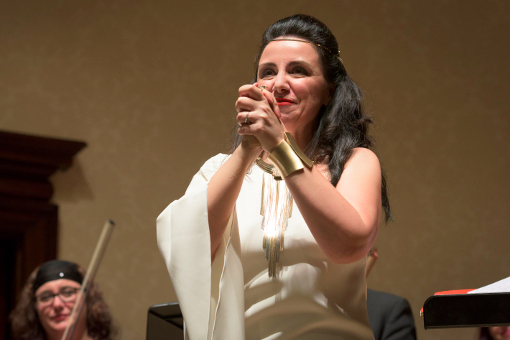
The concert followed a chronological march through many of those composers, ranging from one of the better known, Antonio Caldara (born ~1671) and ending with Manuel García (1775) via a Handel pastiche, a further six near-forgotten composers and two famous ones, Gluck and Rossini. Anna Bonitatibus was joined by the Prague-based Collegium 1704 orchestra, also making their debut at Wigmore Hall, and they played with enthusiasm and obvious pleasure. That their conductor was also the founder of a chamber choir of the same name was evident in his expansive and expressive attention to individual sections, and their dynamic variation. Theirs was quite a dusky sound, complementing the singer’s full and resonant voice, which was quite capable of filling the entire hall with rich harmonics without recourse to excessive vibrato.
Ms Bonitatibus was in terrific form, which was just as well given the demanding programme. In truth, several of the works were from a similar mould and, with 24 hours distance, somewhat indistinguishable; all required the full mezzo range and occasional moments of deep chest voice but mostly fiery, fast coloratura – the sort of repertoire Cecilia Bartoli might sing – launched with gusto, feeling and commitment. She was also perfectly at ease in the temporal trip through the Baroque, Classical and into the bel canto arena, adapting her sense of expression and lyricism to each. A change of evening frock for each set added to the drama of the evening and indeed the sense of moving through time.
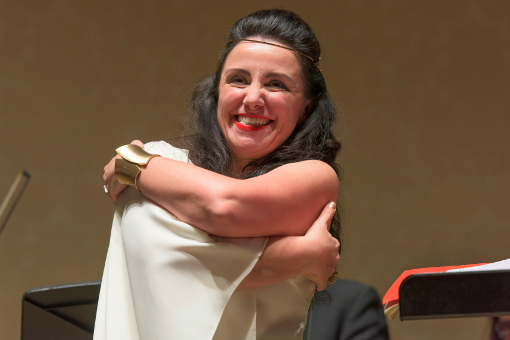
The majority of the pieces were unknown in modern times before being unearthed by Bonitatibus a few years ago. I particularly liked that by Ferdinando Bertoni. Rick Jones’s comprehensive programme notes explained that Bertoni followed in Vivaldi’s footsteps as a teacher in Venice and organist of St Mark’s Basilica, and his brief, reprised verses about love’s arrow put the spotlight on the singer’s strong but flexible upper register with supremely confident ornamentation.
For the post-interval programme, the stage became even more crowded as the removal of the harpsichord left room for extra woodwind and horns. Of the two dances by Charles-Simon Catel, attention was commanded by the second as a light but charming balletic interlude from some weighty drama.
The thread of inter-connection was maintained through the whole programme, with a piece from Rossini‘s operatic score – the last one he composed for Italy. García himself had sung the tenor part in London in 1824 and, after all the fireworks, it was García’s quiet lament that brought the concert to a reflective close. Starting with a brief recitative, and subsequently accompanied only by woodwind and horns, it gave Bonitatibus the space to remind us that for all her technical skill, she can enchant an audience with effortless simplicity. Altogether an exhilarating evening of rarities and novelty, sung with full blooded rigour and moments of quiet poignancy.
Anna Bonitatibus Wigmore Hall, London, review: 'She could out-blast in volume the full 22-piece orchestra'
07/ott/2016

Semiramide 'La Signora Regale'; Anna Bonitatibus, Collegium 1704, Vaclav Luks; The Wigmore Hall
Reviewed by Michael Church for The Independent Oct 07 2016
Rating: ★★★★★
Anna Bonitatibus performed with great intensity at Wigmore Hall.
Po-faced synopses conventionally skate over the fact that most plots in Baroque opera are preposterous, so it was refreshing to find Rick Jones starting his Wigmore Hall programme-note with a cod-historical account of the picaresque doings of Assyrian Queen Sammuramat in ninth-century BCE Babylon. And in the recital which the Italian mezzo Anna Bonitatibus has compiled – from which she’s also made a prize-winning disc – variations on the tale came from eleven 18th-century composers.
Bonitatibus has a voice which, once heard, is never forgotten. This has less to do with its specific qualities than with the vivid intensity with which she invests every role: she’s as boldly dramatic as Cecilia Bartoli, but with none of the affectation. For this outing, in company with Vaclav Luks and his Collegium 1704 Baroque orchestra, her gown-changes – from diaphanous grey, to scarlet, to black, to high-priestess white – reflected the variegated emotional worlds she conjured up.
Spurned love took many forms, each of which she incarnated with Protean ease: with fire and fury in Caldara, darkly flowing melodiousness in Gluck, roller-coaster coloratura in Bertoni, delicate refinement in Rossini, and chaste beauty in Paisiello. She was funny as well as furious, turning some of her numbers into a dance, and proving effortlessly that, when required, she could out-blast in volume the full 22-piece orchestra.
Semiramide 'La Signora Regale' – Anna Bonitatibus at the Wigmore Hall
07/ott/2016
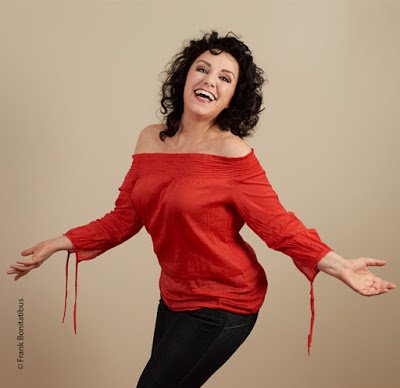
Semiramide 'La Signora Regale'; Anna Bonitatibus, Collegium 1704, Vaclav Luks; The Wigmore Hall
Reviewed by Robert Hugill on Oct 05 2016
Star rating: 4.0
Anna Bonitatibus on terrific form in a programme spanning a century of music about Semiramide
The semi-mythical character of Semiramis (Semiramide), Queen of Assyria, seems to have fascinated opera composers for over 100 years. For her recital at the Wigmore Hall on Wednesday 5 October 2016, Italian mezzo-soprano Anna Bonitatibus gave us a selection of different takes on the character, with the composers ranging from the well-known (Handel, Gluck and Rossini) through the moderately known (Caldara, Vinci, Jommelli and Paisiello) to the unknown (Bertoni, Bianchi, Nasolini, Catel and Garcia). For her journey, Bonitatibus was accompanied by the Czech ensemble, Collegium 1704 conducted by their founder Vaclav Luks.
In fact there were a series of different Semiramides as different librettos concentrated on different aspects of her story, or invented new ones. It wasn't so much the fascination with the historical character as the seductive charm of the mythical Middle East, combined of course with Semiramide's mythical murderous instincts. It could have been a dutiful trawl through some forgotten and rather worthily dull operas, after all not every 18th century opera was really worth reviving. But Bonitatibus brought a vivid sense of theatricality and engagement to each aria, combining a vivid technique with a striking physicality; she certainly is not a singer to just stand and deliver. Though she did use music, she was strikingly engaged with the audience and we had a degree of visual stimulus too. Not just Bonitatibus's highly mobile platform manner, but her four different outfits ensured a striking visual side to the programme.
The programme was played in historical order, so we started with Antonio Caldara (from 1725) and ended with Manuel Garcia (from 1826). Caldara's Semiramide in Ascalona premiered in 1725 and we heard the Introduzione (overture) and Povera navicella. The overture was an attractive Vivaldi-esque piece, followed by a vigorous simile aria with some robust passage-work, to which Bonitatibus added some brilliant ornaments in the Da Capo.
Fuggi dagl'ochi miei comes from Handel's pasticcio Semiramide riconosciuta (from 1733) and is a re-using of an aria by Leonardo Vinci originally written in 1729. Here we had a strikingly dramatic orchestral introduction, followed by an equally dramatic and less showy aria, which allowed Bonitatibus so demonstrate her rich lower register.
Niccolo Jommelli wrote Semiramide riconosciuta in 1741 (using the same Metastasio libretto which Handel had used and which would crop up again in the Gluck and Bertoni operas). Here we had a vivid accompagnato followed by an equally vivid aria which consisted of a fluid sequence of sections and rather reminded me of Jommelli's contemporary Gluck. Having heard Classical Opera's account of Jommelli's Il Vologeso earlier this year, this aria made me interested to hear more.
We had two helpings of Gluck, first a sequence of varied dance movements from his ballet Semiramis of 1765, where we could feel that there was an underlying sense of narrative thanks to the dramatic playing of the ensemble. The opening sinfonia was very recognisable, as Gluck would later re-use it in Iphigenie en Tauride! Then we heard the aria Fuggi dagl'ochi miei from Gluck's version of Metastasio's Semiramide riconosciuta from 1748. Though an earlier work, this still had hints of the later drama which we expect from Gluck.
The first half closed with an aria by Francesco Bertoni, Non so se piu t'accendi comes from his 1767 version of Metastasio's Semiramide riconosciuta. This was a more galant style of music with some fine ornaments, which became quite a showpiece and Bonitatibus included a very striking (over the top?) cadenza. Here as elsewhere, she really threw herself into the music, creating virtuoso, bravura, drama.
The second half opened with the sinfonia from Francesco Bianchi's 1790 opera La vendetta di Nino (a Semiramide opera despite its name). This was an attractively sturm und drang sort of piece, over which the spirit of Mozart seemed to hover. Paisiello's Serbo in seno il cor piagato, from his 1772 opera La Semiramide in villa, was a delight to encounter. Again the spirit of Mozart was invoked in the vocal writing which was touching, yet not uncomplicated.
Serbo Nasolini's Deh sospendi a'pianti miei... Serbo ancora un'alma altera from his 1792 opera La morte di Semiramide started off with a remarkable sequence of accompanied recitative (in dialogue with chorus, represented only by instruments in this performance) which led to a highly serious aria. The whole was full of vivid interest, especially as the vocal writing seemed to provide some remarkable pre-echoes of Rossini [in fact it was by Rossini, see the Update below]. This is not as strange as it might seem, as Nasolini's opera had quite an after life, being performed right up to 1815, a sign of the way opera was changing.
Charles-Simon Catel's opera Semiramis from 1802, was represented by a pair of dances the first of which was intriguingly varied, and the second rather perky with hints towards the later 19th century.
The most famous, and last major opera on the subject of Semiramide is of course Rossini's 1823 version. Here we had the best known aria, Bel raggio lusinghier, in a terrific performance where Bonitatibus combined strong tone with fine control of the fioriture. But this was not the end, we heard an aria from the opera Semiramis by Manuel Garcia, the father of Maria Malibran. This was rather an intense prayer, beautifully done.
The substantial programme was ecstatically received, and Bonitatibus treated us to two further arias. First of all something from Semiramide by the great castrato, Girolamo Crescentini, and then something from Nicola Porpora's Semiramide regina dell'Assiria. Both were extremely impressive in their show-off nature, but the latter was great fun too!
The recital was based on Bonitatibus's 2015 Gramophone Award winning disc, but this was much more than a simple concert of the CD. It was terrifically engaging recital, and Bonitatibus really brought the sometimes unknown music to life. She took quite a vigorous approach to everything, and whilst there was an element uniformity to her approach, the sheer vividness of her performances captured you. She was well supported by Vaclav Luks and Collegium 1704, with an ensemble which went from simple strings and continuo to the full orchestra with horns required by Rossini. Collegium 1704 may not have played with the most brilliant sense of burnished tone but they brought a characterful vividness to the playing.
Update: I heard from Anna Bonitatibus that in fact the scena from Nasolini's La morte di Semiramide was from the 1815 performance in Naples, where the soprano was Isabella Colbran. The scena used music by Nasolini and Marcos Portugal, to which Colbran asked the young Rossini to 'fix' the ending and Rossini took a section from his Cambiale di Matrimonio. You can read more about it at the Consonarte.com website where the music from the recital is available. The website also explains that the version of Bel raggio lusinghier from Rossini's Semiramide was reconstructed from the original manuscript.
RAI Radio 3 – Interview with Anna Bonitatibus October 8th, 2016. Topic: Semiramis by Manuel García
7 Oct 2016
Anna Bonitatibus interviewed on RAI Radio 3 Program Momus by Sandro Cappelletto on n "Al mio pregar t’arrendi" Semiramis by Manuel García.
Program starts on October 8th, 2016 at 11:20 CET.
Semiramide Concert — Wigmore Hall, 7:30pm, October 5th, 2016.
5 Oct 2016
First performance in London of the Gran Scena "La Morte di Semiramide" by Nasolini/Portugal/Rossini. First performed in Napoli, 1815, by Primadonna Isabella Colbran.
As well as the first performance in London of the First Version of "Bel raggio lusinghier" never before performed in history before the project "Semiramide. La Signora regale".
- Anna Bonitatibus – Mezzosoprano
- Václav Luks – Conductor
- Collegium 1704 – Orchestra
- Orchestral Materials in Critical Edition by Davide Verga and Alessandro Monga
- Semiramide — La Signora Regale rental material provided by Consonarte – Vox in musica
Join us this evening for this fascinating and original musical program as we peer into the world of Semiramide, ‘Superwoman‘, builder and warrior, the 'Venus' of Mesopotamia, wife and queen, widow and mother.
Unisciti a noi per il programma affascinante e originale attorno al mondo di Semiramide, ‘Superwoman’ edificatrice e guerriera, la ‘Venere’ della Mesopotamia, moglie e regina, vedova e madre.
Semiramide Concert — Philharmonie Essen, 5:00pm, October 3rd, 2016.
3 Oct 2016
Semiramide – La Signora Regale This evening at Philharmonie Essen, Essen – October 3rd, 2016 at 17h.
- Anna Bonitatibus – Mezzosoprano
- Václav Luks – Conductor
- Collegium 1704 – Orchestra
- Orchestral Materials in Critical Edition by Davide Verga and Alessandro Monga
- Semiramide — La Signora Regale rental material provided by Consonarte – Vox in musica
- Anna Bonitatibus – Mezzosoprano
- Václav Luks – Direttore
- Collegium 1704 – Orchestra
- Materiali d’orchestra in Edizione critica a cura di Davide Verga e Alessandro Monga
- Semiramide — La Signora Regale rental material provided by Consonarte – Vox in musica
Join us this evening for this fascinating and original musical program as we peer into the world of Semiramide, ‘Superwoman‘, builder and warrior, the 'Venus' of Mesopotamia, wife and queen, widow and mother.
Unisciti a noi per il programma affascinante e originale attorno al mondo di Semiramide, ‘Superwoman’ edificatrice e guerriera, la ‘Venere’ della Mesopotamia, moglie e regina, vedova e madre.
Semiramide — La Signora Regale, Festspielhaus, Baden Baden, October 1st, 2016
1 Oct 2016
Semiramide – La Signora Regale This evening at Festspielhaus, Baden Baden – October 1st, 2016 at 18h.
- Anna Bonitatibus – Mezzosoprano
- Václav Luks – Conductor
- Collegium 1704 – Orchestra
- Orchestral Materials in Critical Edition by Davide Verga and Alessandro Monga
- Semiramide — La Signora Regale rental material provided by Consonarte – Vox in musica
Join us for this fascinating and original musical program as we peer into the world of Semiramide, ‘Superwoman‘, builder and warrior, the 'Venus' of Mesopotamia, wife and queen, widow and mother.
Roger Parker Joins Consonarte
15 Sep 2016
We are particularly glad to welcome Roger Parker, Musicologist and Professor at King's College of London, and announcing his participation to our publishing project!
Consonarte Editions Available at Mitarotonda
23 Jun 2016
As of today our Editions dedicated to Lirica da Camera, are available in store: Mitarotonda in Milan, 37 Via Filippo Corridoni. Visit this historic music store established in 1888.
A partire da oggi le nostre Edizioni dedicate alla Lirica da Camera, sono disponibili presso il negozio Mitarotonda a Milano, in Via Filippo Corridoni, 37. Visiti lo storico negozio di musica attivo dal 1888.
Nel cor più non mi sento — Now available!
1 Jun 2016
Nel cor più non mi sento Vocal score for Soprano/Mezzo-soprano & Piano now available and specially priced for limited time. Special offer until June 20th!
Nel cor più non mi sento Vocal score for Soprano/Mezzo-soprano & Piano now available and specially priced for limited time. Special offer until June 20th!
La Musica di Semiramide/The Music of Semiramide — Special Offer
23/mag/2016
La Musica di Semiramide, Edizione de Luxe Canto/Piano, per Soprano/Mezzosoprano e Pianoforte assieme all’ incisione discografica, Semiramide. La Signora regale, premiata IOA, cofanetto de Luxe originale, in offerta speciale sino al 30 Giugno!
Special Offer on The Music of Semiramide de Luxe Vocal score until June 30th, 2016.
Nel cor più non mi sento – Pre-order / Prenota
21 May 2016
Pre-order the Collection of Variations on the original theme by Paisiello Nel cor più non mi sento for Voice & Piano, until June, 20th for a special price!
Discover more about Angelica Catalani, Isabella Colbran, Maria Malibran exceptional Variations!
Prenotando la Raccolta di Variazioni sul tema originale di Paisiello Nel cor più non mi sento può ricevere l’Album in offerta speciale, sino al 20 Giugno!
Scopra di più sulle eccezionali Variazioni di Angelica Catalani, Isabella Colbran, Maria Malibran!
UK Premiere Performance
16 May 2016
In a UK live performance premiere, Manuel García’s “Già il perfido discese ... Al mio pregar t'arrendi” from SÉMIRAMIS was sung by Anna Bonitatibus and accompanied by Roger Vignoles on piano at the 2016 International Opera Awards, Savoy Theatre, May 15th, London. Visit the page The Music of Semiramide, de Luxe vocal score version for details.
Prima Esecuzione Nel Regno Unito
16/mag/2016 23:04:01
Prima esecuzione nel Regno Unito de “Già il perfido discese … Al mio pregar t’ arrendi” dalla SÉMIRAMIS di Manuel García, cantata da Anna Bonitatibus e accompagnata al pianoforte da Roger Vignoles all’ International Opera Awards 2016, presso il Savoy Theatre, domenica 15 Maggio, Londra. Visiti la pagina The Music of Semiramide, versione de Luxe Canto/Piano per saperne di più.
Andrea Malnati
23 Apr 2016 22:57:42
We are glad to announce the participation of the young musicologist Andrea Malnati in our publishing project and he will edit the volume of Cantate for Voice and Pianoforte by Girolamo Crescentini.
Siamo lieti di annunciare la partecipazione al nostro progetto editoriale del giovane musicologo Andrea Malnati che curerà l’edizione delle Cantate per Voce e Pianoforte di Girolamo Crescentini.
Ventiquattro Ariette
15 Apr 2016 20:33:00
Ventiquattro Ariette by Giovanni Battista Perucchini, New Edition has arrived! In order to learn more, consult the Series Canto recital
Ventiquattro Ariette di Giovanni Battista Perucchini, nella Nuova Edizione è appena arrivato! Per saperne di più, consulti la Collana Canto recital

Dear Reader,
We are particularly glad to extend our Welcome.
Consonarte - vox in musica, a new project of musical editions and productions, is online as of today at the service of the most attentive and refined interpreters of contemporary performances.
We invite you to explore our already completed material – and those currently in the works –
presented to you in the different sections of our site.
Enjoy surfing!
February 1st, 2016


